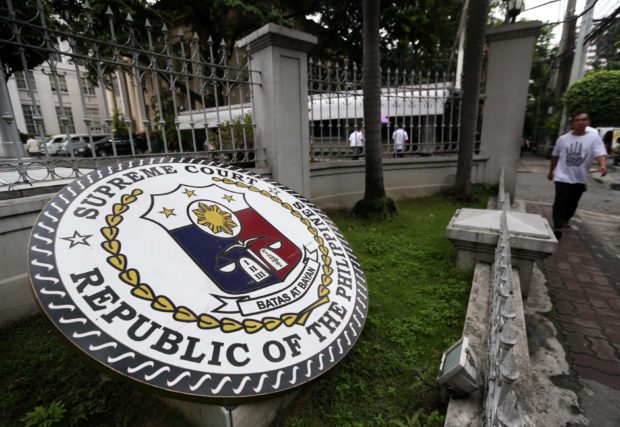SC dismisses petition that questions anti-hospital deposit law

The Supreme Court symbol in Manila. (File photo LYN RILLON / Philippine Daily Inquirer)
MANILA, Philippines–The Supreme Court has dismissed the petition that challenges the validity of the law that increases the penalties for owners of clinics, hospitals as well as physicians and personnels that demanded or accept deposits or advance payment as a prerequisite for confinement and for administering basic emergency care.
In its 21-page decision, the high court said the law “enjoys the presumption of constitutionality which the Court, at the first instance, cannot disturb in the absence of a prima facie showing of grave abuse of discretion and, upon delving into the merits, in the absence of a clearest showing that there was indeed an infraction of the Constitution.”
“If the Court were to invalidate the questioned law on the basis of conjectures and suppositions, then it would be unduly treading questions of policy and wisdom not only of the legislature that passed it, but also of the executive which approved it,” the high court said.
The SC’s ruling dismisses the petition filed by Private Hospitals Association of the Philippines, Inc. (PHAPi), an organization of privately-owned clinics, hospitals, and other health facilities.
In their petition, they said they were denied due process, the right to be presumed innocent, equal protection, and subjected them to involuntary servitude.
Article continues after this advertisementThe association alleged that the “basic emergency care” and “emergency treatment and support” under RA 10932 “imposes upon the physician, the hospital, its management and staff the untenable duties to actually prevent death, permanent disability, permanent injury to or loss of an unborn baby or its non-institutional delivery and to sufficiently address an emergency situation and in case of a woman in active labor, to ensure the safe delivery of the baby.”
Article continues after this advertisementThey said “the duty imposed by RA 10932, being predicated on the achievement of an end that is impossible to guarantee, amounts to a denial of due process.”
In dismissing their petition, however, the high court only delved with the procedural aspect of the case saying petitioner has no legal standing and there is no actual or justiciable issues presented.
The high court added that PHAPi also failed to follow the hierarchy of courts, meaning it should have been raised first before the lower courts.
“The present petition, while directed against an act of a co-equal branch of the government and concerns a legislative measure directly affecting the health and well-being of the people, actually [failed to present enough basis] to be so exceptionally compelling to justify direct resort to this Court,” the SC said.
On April 4, 2018, the Department of Health (DOH) issued Administrative Order No. 2018-0012 that implements RA 10932.
Aside from banning the request, solicitation, demand or acceptance of deposit and advance payment, RA 10932 also expanded the scope of “basic emergency care” to include “medical procedures and treatment administered to a woman in active labor.”
Under the law, local government units where the hospital or clinic are located is required to provide free medical vehicle in case a transfer to another hospital is needed.
A violation imposes the penalty of of imprisonment of not less than six (6) months and one (1) day but not more than two (2) years and four (4) months, or a fine of not less than Pl00,000.00, but not more than P300,000.00, or both at the court’s discretion.
But if the violation was made based on hospital policy or management instruction, the penalty increases against the director or officer formulating and implementing such policy to four (4) years to six ( 6) years, or a fine of not less than P500,000.00, but not more than Pl,000,000.00, or both, without prejudice to an award for damages.
There is also the so-called “the three-strike rule, or when upon three repeated violations committed pursuant -to an established policy or upon instruction of the management, the health facility’s license to operate shall be revoked by the Department of Health (DOH).”
It holds “the president, chairman, board of directors, or trustees and other officers of the health facility solidarily liable for damages.”
At the same time, RA 10932 “presumes liability against the hospital, medical clinic, and the official, medical practitioner, or employee involved, in the event of death, permanent disability, serious impairment or permanent injury to or loss of an unborn child, proceeding from the denial of admission to a health facility pursuant to a policy of requiring deposits or advance payments for confinement or treatment.” /jpv